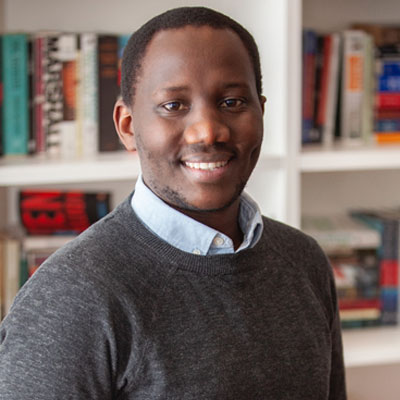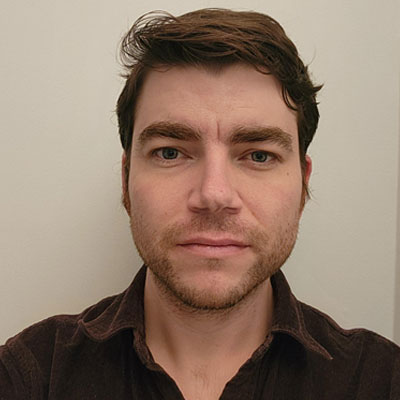On Thursday, June 6th join us for our hybrid lunch & learn panel with New College’s Senior Doctoral Fellows (SDF), Moses Karanja of the African Studies Centre and Andrew Young of Centre of Caribbean Studies, part of the 2023-2024 SDF Speaker Series.
Hosted by Marieme Lo and Kevin Edmonds
Join us in person at New College’s Sally Walker Council Room or online via Zoom.
Lunch will be provided for those joining in person
Speakers & Presentations
Presenter: Moses Karanja
Karigi and Equb in Memoriam? Financial Inclusion, Cashless Inevitability, and the Supposed March towards Digital Africa
Moses in his presentation will be tracing the epistemic trajectory of the claim that digital technologies are the necessary development bridge in African countries. The origins and diffusion of three key concepts of this claim; digital identification, financial inclusion, and cashlessness are compared and assessed in their everyday experiences in Kenya and Ethiopia. His paper illustrates their shared origins in econometric experiments between 2001 and 2010, and their application across multiple countries as a function of authoritative trust fixation within the networks of technology companies, private capital, debt-ridden African states, the World Bank, and philanthropic organizations. By legitimizing everyday surveillance and structuring digital networks, the value proposition of digital technologies for development in the face of old-school community welfare mutualism models like Karigi in Kenya and Equb in Ethiopia is not obvious. Digital technologies, Moses’ argues, should earn their trust in practical experiences and their inherent assumption to leapfrog missing identification and financial public infrastructure should not be assumed as necessary or essential.
Biography:

Moses Njoroge Karanja is a PhD candidate in Political Science at the University of Toronto with academic interest on the co-evolution of technology and international relations. He is currently working on his thesis on the evolving global digital identification ecosystem, whose working title is “The Co-evolution of Identification and Payment Practices in Kenya and Ethiopia from 1870 to Present”.
Moses is also affiliated with The Citizen Lab, an interdisciplinary laboratory at the Munk School of Global Affairs and Public Policy at the intersection of information and communication technologies, human rights, and global security. In addition to his academic work, Moses has been involved for several years in community building in the African region, monitoring internet censorship, and building circumvention tools in countries as varied as Ethiopia, Rwanda, and Zambia. Born and raised in Kenya, Moses speaks, reads, and writes in Gĩkũyũ, Kiswahili, and English.
Fellowship Affiliation: African Studies Centre
Primary Department: Political Science
Contact: moses.karanja@utoronto.ca
Presenter: Andrew Young
Symphor Linstant de Pradine: A Haitian Critique of Capitalism
Andrew will sketch the outline to an alternative theory of capitalism, based on libidinal economy, drawing on the work of Haitian lawyer Symphor Linstant (later created Baron de Pradine). Linstant’s 1841 Essai sur les moyens d’extirper les préjugés des blancs, shows that racism is an enabling condition for capitalism. Linstant argues that in the US, where this aristocracy is developed to its maximum, white Americans can accept massive inequalities of wealth because of the affective anchor of equality in whiteness. Even without slavery, the social role of head of household, capable of owning slaves, is internalized by the white American causing them to become maximally self-interested. They hoard resources for libidinal reasons because they are no longer able to consider their interests to be aligned with the common good. The need to separate people and to convince them that their personal interests are opposed to the general interest is a cornerstone of Linstant’s critique of the colonial order, which he will argue forms the foundation for the critique of capitalism which we can extrapolate from his work. His goal is to explicate Linstant’s thinking but also to explore what his argument means for the idea of a critique of capitalism, if capitalism is necessarily gendered, racialized, and colonial in origin.
Biography:

Andrew Young is a PhD candidate in the Centre for Comparative Literature at the University of Toronto. His dissertation is a study of Haitian literature written to achieve diplomatic recognition from Europe and the United States, from 1797 to 1859. By reading Haitian writings, both literary and polemical, as political philosophy, he aims to uncover Haitian contributions to our understandings of sovereignty, international law, and revolution.
Fellowship Affiliation: Centre for Caribbean Studies
Primary Department: Centre for Comparative Literature
Contact: andrewj.young@mail.utoronto.ca
Event Details:
Thursday, June 6, 2024
12 p.m. – 1:30 p.m. ET
Online: Zoom
In-person registration is now closed. Please reach out to nc.progsupport@utoronto.ca if you have any questions. In-person: Sally Walker Council Room, New College, Rm 2053 – 20 Willcocks Street, Toronto

